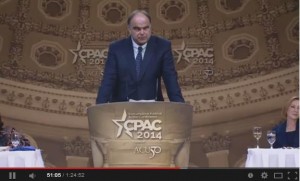Robert Paquette, Charter Fellow of the Alexander Hamilton Institute for the Study of Western Civilization (AHI) has published in the spring 2016 issue of the journal Academic Questions an article that provides new information about Chief Justice Roger Taney and his thinking in the case of Dred Scott v. Sandford (1857), one of the most important and controversial cases ever decided by the United States Supreme Court. Academic Questions, the official journal of the National Association of Scholars (NAS), is “dedicated to strengthening the integrity of scholarship and teaching.” Paquette’s article, “The Mind of Roger Taney: New Light on the Dred Scott Decision” inaugurates “Disciplinary Notes,” a new feature of the journal.
Scott was a Missouri slave who had been taken by his owner to free soil in Illinois and Minnesota. With the help of antislavery white friends in Missouri, Scott sued in a Missouri lower court in 1846 to obtain his freedom on the grounds that the fact of his having entered a free state had ipso facto released him from bondage. Before the case reached the United States Supreme Court, the Supreme Court of Missouri had overruled a lower court’s decision to grant Scott his freedom. In a 5-2 decision, with Taney leading the way, the Supreme Court reaffirmed Scott’s enslavement by arguing that by returning to Missouri the laws of that state would apply. Taney’s opinion, however, went far beyond the narrow question of Scott’s status, entering into the questions of Congressional authority under the Constitution and the validity of the Missouri Compromise.
In performing archival research on a related project, Paquette came across a letter, never before published, from British consular official, G. P. R. James in Richmond, Virginia, to his superiors in the Foreign Office on the tumultuous political situation in the United States in 1857. James, a widely read novelist at the time, referred to Taney as an “old and intimate friend” and conversed with him multiple times shortly after Taney had rendered his opinion in the case. James’s missive amounted to confidential intelligence, drawn from someone James considered one of the “most enlightened of the Statesmen of this Country,” on the likelihood and consequences of a rupture between North and South. James discussed the Dred Scott case and many other volatile issues with Taney. Paquette points out that James’s intelligence contradicts the view of some scholars that Taney hoped his far-reaching opinion in Dred Scott would settle once and for all the controversial question about whether Congress had the power to prohibit slavery in the territories. The essay discusses James, analyzes his letter, and provides an edited transcription of the entire letter.
Robert L. Paquette is Professor of History at Hamilton College and a co-founder of the AHI. Professor Paquette is an expert on conservative thought and an advocate for the freedom of expression on college campuses. Professor Paquette holds a B.A. from Bowling Green State University and a Ph.D. from the University of Rochester. He is also the author of many books and articles including “Sugar Is Made with Blood: The Conspiracy of La Escalera and the Conflict between Empires over Slavery in Cuba and History” and “Women, Culture and Faith: Selected Writings of Elizabeth Fox-Genovese.” In 2014, Paquette was awarded the Jeane Jordan Kirkpatrick Prize for Academic Freedom, by the Lynde and Harry Bradley Foundation and the American Conservative Union Foundation.


Leave A Comment